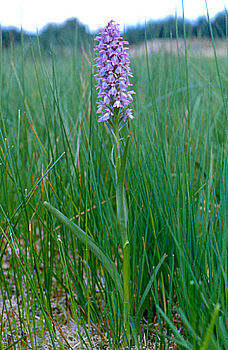|
English
name:
|
|
Own
language name:Orchis des sphaignes
|
| Description: plant with palmated tuber, 20 - 50 cm high, flowers in june and july, pink to purple. The leaves are lanceolates anf they grow along a rather long stem which reaches a height of 70-90 cm. Leaves higher on the stem are shorter than leaves lower on the stem. Inflorescence consists of a compact raceme with 25-50 flowers developed from axillary buds. |
|
Distribution:
In Belgium
:Campinien,
ardennais and lorrain districts, mostly in Haute Ardenne.
|
|
Habitat:
acid bogs, boggy forest, peats, often among sphaignes.
|
|
Report about the reasons of the risk: not very threatened in Wallonie but there is a risk of introgression owning of hybridation with Dactylorhiza maculata. |
|
Categoria IUCN: 2, CR, critically endangered
|
|
Possible solutions: preservation
of the biotope.
|
|
Culinary
and/or medicinal properties, folk wisdom : In the antiquity, plant
where used in case of masculine sterility.
|
|
Appearance in
the Literature and Arts: The name "Orchis" comes from
"Orkis" the greek name for testicles because of the
form of the two rhizomatical bulbs of many Orchidaceae, observation of
Theophraste (372 - 287 AC), a disciple of Aristote.
|

|
![]()